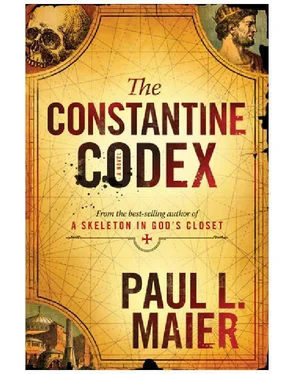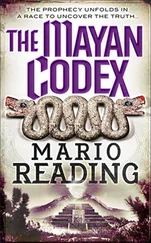Paul Maier - The Constantine Codex
Здесь есть возможность читать онлайн «Paul Maier - The Constantine Codex» весь текст электронной книги совершенно бесплатно (целиком полную версию без сокращений). В некоторых случаях можно слушать аудио, скачать через торрент в формате fb2 и присутствует краткое содержание. Жанр: Триллер, на английском языке. Описание произведения, (предисловие) а так же отзывы посетителей доступны на портале библиотеки ЛибКат.
- Название:The Constantine Codex
- Автор:
- Жанр:
- Год:неизвестен
- ISBN:нет данных
- Рейтинг книги:5 / 5. Голосов: 1
-
Избранное:Добавить в избранное
- Отзывы:
-
Ваша оценка:
- 100
- 1
- 2
- 3
- 4
- 5
The Constantine Codex: краткое содержание, описание и аннотация
Предлагаем к чтению аннотацию, описание, краткое содержание или предисловие (зависит от того, что написал сам автор книги «The Constantine Codex»). Если вы не нашли необходимую информацию о книге — напишите в комментариях, мы постараемся отыскать её.
The Constantine Codex — читать онлайн бесплатно полную книгу (весь текст) целиком
Ниже представлен текст книги, разбитый по страницам. Система сохранения места последней прочитанной страницы, позволяет с удобством читать онлайн бесплатно книгу «The Constantine Codex», без необходимости каждый раз заново искать на чём Вы остановились. Поставьте закладку, и сможете в любой момент перейти на страницу, на которой закончили чтение.
Интервал:
Закладка:
He nodded. “All but the geniza, of course.”
Jon chuckled at the man’s use of a Hebrew term. “The geniza? I didn’t know you were Jewish! A sacred dump for old Scriptures?”
Brother Gregorios joined in the laughter. “Well, that’s what we call our room for… bad manuscripts-I want to say-for leaves missing from books or… or codices with bindings cracked and pages that are not readable or are too torn to save. We do try to save some of them when we can. And maybe even try to rebuild them-no, what is the word?”
“Rebind them?” Shannon offered.
“Yes, rebind them.”
“And where is your geniza?” Jon asked.
“In the basement.”
“The basement? I hope you have humidity control.”
“Oh yes, the whole library and archives-and basement-are at 48 percent humidity and twenty degrees temperature.”
“Twenty degrees, you say?”
“That’s centigrade, Jon,” Shannon said. “In Fahrenheit it would be about… sixty-eight degrees.”
Jon made a mental note: Think first; speak later.
As they were walking out of the library, Jon did an about-face. The opportunity was simply too good to pass up. He walked back to Gregorios’s office and asked, somewhat sheepishly, “I wonder, good brother-just to complete our tour-if we might briefly visit also the geniza?”
“Well, there’s not much to see there, but… as you wish.”
He led them into the basement. The room was poorly lit. Next to the light switch was a clear plastic cube with temperature and humidity barrel graphs, showing that at least the proper environment was being maintained. As Gregorios had assured them, the temperature was a slightly cool but comfortable twenty degrees Celsius and the humidity was carefully controlled. Otherwise, mold would have blanketed everything in this literary catchall and ruined it.
It was hardly a picture of disciplined order. On the east side of the room were torn books, orphaned printed pages, and empty bindings. In the center was an apparently uncataloged miscellany of dusty manuscripts in partial state of preservation, and at the extreme western edge of the room were stacks of ponderous old tomes bowing the wooden shelves with their weight.
“Ugly as all this appears, Jon,” Shannon said, “I suppose our teams will have to photograph every bit of it?”
“Most of it, I think. There may be some golden nuggets in this junk heap.”
Jon tried to discern the arrangement of materials in the room, but there seemed to be little or none. Shannon walked over to the fat tomes, pulled one off the shelf, and blew dust off it. She opened to the title page, and her eyes widened. “Listen to this, Jon: Omile Hrisostomou, 491-496. That would be Sermons of Chrysostom, AD 491-496, written in Constantinople in 847.”
“Interesting,” Jon said. “Even though we have those sermons elsewhere, a ninth-century codex is nothing to sneeze at.”
“Ye-yes it is!” Shannon snorted in nasal tone, as she inhaled suddenly and let loose with a colossal sneeze. “Sorry. It’s the dust.”
The other ancient tomes offered more sermons by Greek church fathers. Shannon turned to another codex that was almost on the floor, since its weight had bulged the too-thin wooden shelf supporting it. Holding her nose, she blew the dust off the faded calfskin stretched across a thin wooden board cover. “This one looks like it’s fairly complete, although the back cover is missing.” Opening to the title page, she read aloud: “Biblia Beta. Kaine Diatheke tou Kuriou Iesou Christou…”
She read on silently, then asked, “What do you think? This one could be interesting.”
Jon made no response. He was busy in the miscellaneous manuscript section.
“Jon, did you hear me?”
“What’s that, Shannon?”
“We have an interesting title page here, in very elegant lettering.” She repeated the Greek for what, in English, would be “Book Two: The New Testament of our Lord and Savior Jesus Christ, one of fifty copies.”
Jon hurried over to Shannon’s side and examined the page. His eyes narrowed. He glanced further down the title page and read aloud the rest of the Greek, followed by his translation, as he would write it out later that day in the same relative positioning as the Greek: One of fifty copies commissioned by Caesar Victor Constantinus Maximus Augustus and servant of God who authorized Eusebius Pamphili to have these prepared by his scribes in the church at Caesarea Palaestina and distributed throughout Constantinople in the year 1088 AUC
Jon realized he was breathing heavily. His face grew flushed. His pulse accelerated, and his hand actually trembled as he paged quickly through random sections of the codex. Finally he halted his frenetic paging and stared at her. “My darling,” he began, in what sounded more like gargle than elocution. He cleared his throat and tried again. “Do you have any idea what you’ve found here?”
“Well, Constantine’s name is on it, so it must be significant. But what about that date? Constantine died in 337, but this is from 1088, and we have many materials from the eleventh century.”
“That’s 1088 AUC, Shannon. Ab urbe condita -from the founding of the city.”
“Rome, of course-founded 753 BC!” Shannon recalled. “Okay, so our date is 1088 minus 753 or… AD 335?”
“Right. And that’s exactly when Eusebius says Constantine commissioned him to do this.”
“So this could be the real thing, Jon?”
He slowly shook his head. “I’d hate to be premature, but yes, it could well be.” He broke into a great smile. “It’s well known that Constantine had commissioned Eusebius to prepare fifty elegant copies of Scripture, but none of them has ever been found. And just look at the layout: four handsome columns of beautiful Greek lettering on each page of vellum, just like the Codex Sinaiticus, which dates only a bit later.”
Jon paged further in growing excitement. “Aside from the Sinaiticus, we have only two other codices from that time: the Vaticanus and the Alexandrinus. This is… this could be… well, I’m not given to superlatives. Let’s just say that this might be a… a simply stupendous find. Depending on what the text says, this could… well, it could be a discovery far more important than even the Dead Sea Scrolls! How in the world, Shannon, do you have such off-the-wall great luck, such over-the-top serendipity, that-?”
“Oh, Professor Weber,” said Brother Gregorios, who had just appeared in the doorway, “have you seen enough of our tattered collection?”
“Yes, thank you, good brother.” Then he whispered to Shannon, “Just put this back exactly where you found it.”
On the way back to the hotel, Jon unpacked his strategy. “We had no time to get into the text, Shannon, so telling anyone there what we found would have been totally premature. And foolish! If the thing is authentic-and how in the world could it not be?-it will stun the entire scholarly world. Report it too early, and it would become a cause celebre and complicate any evaluation. We could even be denied further access to it.” If Jon had one questionable habit, it was his proclivity to overexplain things to people, born of many years’ teaching university undergrads, who, in fact, needed his careful reiteration of what might have seemed obvious.
The moment they returned to the Hilton, Jon headed for his laptop, found the folder on the early church fathers, and opened a work by Eusebius called Vita Constantini – The Life of Constantine. He paged through the document until he came to chapters 36 and 37, where he read aloud, for Shannon’s benefit, the dated though colorful translation from The Nicene and Post-Nicene Fathers of the Christian Church. It began with Eusebius’s transcription of Constantine’s own letter, written from Constantinople to Eusebius in Caesarea. VICTOR CONSTANTINUS, MAXIMUS AUGUSTUS to Eusebius, It happens, through the favoring providence of God, our Savior, that great numbers have united themselves to the most holy church in the city which is called by my name. It seems, therefore, highly requisite, since that city is rapidly advancing in prosperity in all other respects, that the number of churches should also be increased. Do you, therefore, receive with all readiness my determination on this behalf. I have thought it expedient to instruct your Prudence to order fifty copies of the sacred Scriptures, the provision and use of which you know to be most needful for the instruction of the Church, to be written on prepared parchment in a legible manner, and in a convenient, portable form, by professional transcribers thoroughly practiced in their art. The procurator of the diocese has also received instructions by letter from our Clemency to be careful to furnish all things necessary for the preparation of such copies; and it will be for you to take special care that they be completed with as little delay as possible. You have authority also, in virtue of this letter, to use two of the public carriages for their conveyance, by which arrangement the copies when fairly written will most easily be forwarded for my personal inspection; and one of the deacons of your church may be entrusted with this service, who, on his arrival here, shall experience my liberality. God preserve you, beloved brother.
Читать дальшеИнтервал:
Закладка:
Похожие книги на «The Constantine Codex»
Представляем Вашему вниманию похожие книги на «The Constantine Codex» списком для выбора. Мы отобрали схожую по названию и смыслу литературу в надежде предоставить читателям больше вариантов отыскать новые, интересные, ещё непрочитанные произведения.
Обсуждение, отзывы о книге «The Constantine Codex» и просто собственные мнения читателей. Оставьте ваши комментарии, напишите, что Вы думаете о произведении, его смысле или главных героях. Укажите что конкретно понравилось, а что нет, и почему Вы так считаете.












